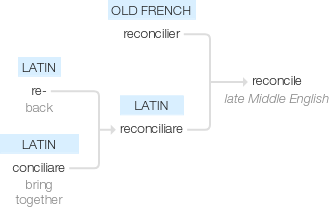Reconciliation
late Middle English: from Old French reconcilier or Latin reconciliare, from Latin re- ‘back’ (also expressing intensive force) + conciliare ‘bring together’.
wiktionary
From Middle English reconciliacioun(“act of reconciling; state of accord or harmony;”)[and other forms], [1] from Anglo-Norman reconciliaciun, reconsiliacion, reconsiliaciun, and Middle French reconciliation, reconsiliacion, reconsiliation(“act of reconciling; result of this act; act of bringing about agreement or harmony; reconsecration of a desecrated place”) (modern French réconciliation), and from their etymonLatin reconciliātiō(“reinstatement, renewal, restoration; reconciliation”) (compare Late Latin reconciliātiō(“reconciliation; reconsecration of a desecrated place”), from reconciliāre + -iō( suffix forming abstract nouns from verbs). [2]Reconciliāre is the present active infinitive of reconciliō(“to bring together again, conciliate, reconcile, reunite; to bring back; to recover, re-establish, regain, restore, win back”), from re-( prefix meaning ‘again’) + conciliō(“bring together, unite; to gain; to win over; to recommend; to procure, purchase”) (ultimately from Proto-Indo-European *kelh₁-(“to call, cry, summon”)).
etymonline
reconciliation (n.)
mid-14c., reconciliacioun, "renewal of friendship after disagreement or enmity, action of reaching accord with an adversary or one estranged" (originally especially of God and sinners), from Old French reconciliacion (14c.) and directly from Latin reconciliationem (nominative reconciliatio) "a re-establishing, a reconciling," noun of action from past-participle stem of reconciliare (see reconcile).
From 1729 as "act of harmonizing or making consistent." Other early noun forms included reconcilement (mid-15c.), reconciling (late 14c.).
